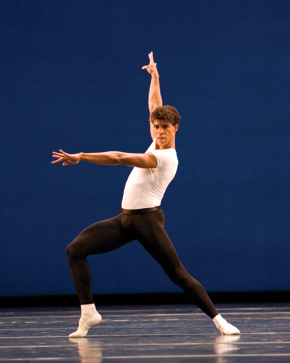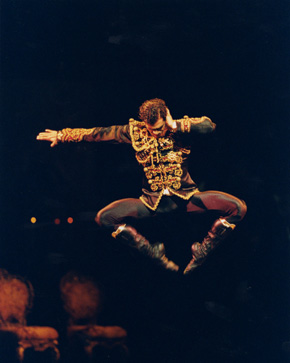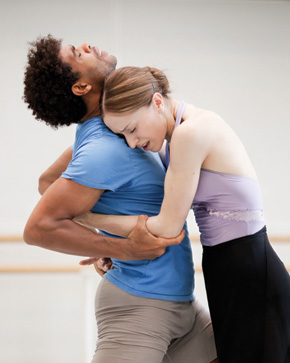|

Carlos Acosta dances the
pas de deux for Agon.
It is often said that being admitted into the Royal Opera
House’s inner sanctum is like being on an ocean liner from
the golden age of steam.
This afternoon I am there to meet Carlos
Acosta, the world’s foremost classical ballet
dancer, so it certainly feels this way.
Buzzed in through the stage door entrance
and into a cosy, old-fashioned reception area,
I am led into a labyrinth of narrow corridors
and endless double doors. Aside from the
rehearsal calls for performers and production
staff reverberating over the PA system, there is
a hushed, almost reverential air to the place.
Once inside, time seems to slow and real
life is left behind. It takes an eternity to make
our way to the office where I am to interview
Carlos Acosta, negotiating the lifts and complex
colour-coded floor levels.
It is as if the building itself is a mirror to
the intricacies and traditions that drive
classical ballet.
The Cuban superstar literally hobbles in and wearily sits himself
down. He has only recently had surgery on his foot to repair
floating bones and
is astonished at how quickly his body is recovering.
‘I’m still in pain’, he says matter-of-factly.
‘But surgery and injuries are
a normal aspect of dance.’ He appear slighter than the
muscular form that
gracefully dominates the stage in his performances and lean
in the way
only athletes can be, but the dynamic, alpha-male presence that
Acosta is so
famous for, is definitely there.
‘Our body is our instrument,’ he says, referring
to dancers. ‘But anything
can affect your work and it’s very hard to be 100% all
of the time.’ With
humility, which I later come to realise is typical of Acosta,
he sounds like
any other sportsperson sizing up his performance. However, this
is no
average athlete, and the ‘body’ he refers to, no ordinary
instrument. Wowing
audiences ever since he first emerged onto the
international ballet scene as a teenager, Acosta has
taken what is arguably one of the last bastions of
high art by storm, lending it something real and
very human. He is routinely compared with the
great classical stars Nureyev and Baryshnikov, and
is often described as one of the most influential
dancers of our time.
His story is all the more compelling when you
learn of his impoverished upbringing in the back
streets of Havana, his ambitions to be a footballer
and his father’s insistence that he study ballet to
keep him from fraternising with street gangs.
Artistic expression
For an artist so universally lauded throughout
his career, there is no trace of arrogance or sense
of entitlement about him. He is relaxed, friendly
and open, displaying a wry sense of humour
throughout the interview. He seems happy just to
chat while on a break from his intense rehearsals
for the one-act ballet Winter Dreams.
| ‘ROMEO IS VERY DEMANDING
AND A ROLE THAT DOESN’T
COME NATURALLY TO ME.
I AM POWERFUL AND BIG. I AM
APOLLO AND SPARTACUS.
I’M NOT BOYISH.’ |
We begin with Acosta’s latest undertaking outside of dance.
After three
years in the making, he has just completed his first novel.
A story about the
history of Cuba from the time of slavery to the current day,
it is his first
work of fiction, and follows his 2007 autobiography No Way Home.
‘I’m finished and I’m proud of it, but I never
want to write another word again. My hair is falling out because
of it!’ he jokes. ‘I enjoyed the process, but writing
drains you. I was doing it between breaks in dance rehearsals
and production meetings, so it was tiring. But I am trained
to finish what I start. We’ll see if people like it.’
Indeed, it’s hard to imagine where Acosta finds the time
for all his numerous projects, from writing and staging his
own ballets (the highly acclaimed and successful Tocororo),
to appearing in the feature film New York, I Love You last year
with Natalie Portman, as well as a packed schedule of international
guest appearances and tours.
|
 |
Despite turning 37 this year, a time when a dancer might traditionally
contemplate retirement, Acosta is doing nothing of the sort.
‘I need challenges otherwise I get bored,’ he says,
leaning back into his chair, his strong, commanding physique
draped in tracksuit pants and a sweatshirt.
One of these new challenges came in the guise of Premieres,
an experimental, mixed media Sadler's Wells collaboration blending
dance and film, staged at the London Coliseum over the summer.
I ask him if this kind of production is the future of dance.
‘It’s just one aspect of dance,’ he replies,
his English shot through with a rich Cuban lilt, ‘and an
idea that hasn’t been explored much before, so it was interesting
to see the results. Sometimes I succeed in producing something
worth seeing and sometimes I don’t,’ says Acosta,
perhaps referring to the production’s mixed reviews. ‘But
I’m not afraid to explore.’
He goes on, ‘An artist should never be afraid to explore.
In exploring lies the search for a new world waiting to be discovered,
or a new path that hasn’t been taken before. This is how
art and dance evolve.’
Listening to Acosta talk freely about himself and his art is
an almost poetic experience, partly because he avoids convenient,
trite sound-bites and also, I suspect, because there is no PR
present to curb his musings. Something that is both surprising
and refreshing.
Inner drive
Throughout his career, Acosta has danced all the big classical
roles – Giselle’s Albrecht, Siegfried in Swan Lake,
the demanding Spartacus – bringing to them his signature
strength and physicality. But he is brutally honest about how
his familiarity with the roles at this stage in his career has
its limitations artistically.

Carlos Acosta as Prince Rudolph
in Mayerling.
‘I have to ask how I can deliver what I know so well in
a new and interesting way. I need to constantly find other challenges
outside of these classical roles to help me continue with my
career. If the only thing I have to look forward to is the classics,
that would be very boring.’
Acosta’s tireless drive and pursuit of achievement is
tangible. Beneath his disarmingly charming and easy-going manner,
is a steely resolve. It is visible in his eyes when he talks,
an unwavering focus. This is a man who never stops. He goes
on to reveal that part of this inner drive also comes from disaffection
in his life.
‘I find if I have a lot of time on my hands, then thoughts
get into my mind. I don’t like to think. I begin thinking
and I get depressed.’ I ask him if his well-documented
home-sickness for Cuba is at the root of this. He nods sadly,
‘I miss Cuba.
here is a guilt at not being there. But as long as I have new
doors opening for me, then it’s okay.’ Acosta accepts
that his phenomenal success has come at a cost.
A faraway look comes into his eyes, ‘Cuba is a long way
away. It’s not like travelling three hours to Spain. I
have had all this wonderful success, but have not had my family
around me to share in it.’ Our man in Havana In 1991, aged
only 18, Acosta was invited to join the English National Ballet
as a principal by its then director Ivan Nagy. It was the start
of a career working with major ballet companies in Europe and
America, but it also marked the start of prolonged periods away
from his home and family in Havana. In the 1990s, it was extremely
difficult to travel to and from the socialist island nation.
Now, he feels, it is more open and, as an international dance
star, he has the freedom to go back and forth. He tells me about
his big house in Cuba and his future plans to live there with
his English girlfriend.
‘Eventually, I want to help the dance field in Cuba and
be involved in everything that is happening there,’ he
explains. ‘Cuba has been disconnected from the rest of
the world for a long time now.’
Dance is an enormous part of Cuban life, and the huge success
of ballet as an art form in Cuba is deeply entwined with the
revolution itself. Since the political events of 1959, ballet
has been a significant and accessible part of Cuba’s cultural
heritage. Much of this success is attributed to the work of
Cuban national treasure and the Godmother of Cuban ballet, Alicia
Alonso.
Director of the Cuban National Ballet since its official founding
in 1960, Alonso set up the company and its training programme
with considerable financial support from Fidel Castro’s
new political regime. To this day, the Cuban school of dance
is universally recognised throughout the world as exceptional.
|
 |
As Acosta explains, ‘The Government was very involved
in ballet from the beginning and gave it the seal of approval.
It formed the schools. Ballet was always on TV. Fidel Castro
himself was always attending ballets.
Everybody in Cuba embraced the idea. After 50 years of this,
what you have is a country very well educated in ballet and
the arts.’ For the time being, Acosta lives happily with
his girlfriend in north London and hopes to start a family here
in the UK in the near future.
However, his yearning for Cuba seems to inform much of what
he does and he envisages a life of commuting back and forth
between the two countries.
‘I have plans to go back to Cuba but also to stay connected
with the UK. It’s a great balance for my life to be in
both countries.’ He has nothing but appreciation for his
adopted home of the past 12 years.
‘Britain, to me, is the best country in the world,’
he says smiling. ‘London is a great city. The British embrace
uniqueness, ethnicity and most of all, talent.
In London, if you are talented, it doesn’t matter where
you come from. If you prove yourself, the sky’s the limit.
The Royal Ballet is proof of this.’
| ‘IN LONDON, IF YOU ARE TALENTED,
IT DOESN’T MATTER WHERE YOU COME FROM. IF YOU PROVE
YOURSELF, THEN THE SKY’S THE LIMIT. THE ROYAL BALLET
IS PROOF OF THIS.’ |
In control
A permanent member of the Royal Ballet in Covent Garden since
1998, Acosta is currently principal guest dancer with the company.
When I ask him what his favourite dance role has been to date,
he says all of them, and reveals a more spirited and playful
side with just a dash of Latin American machismo. He mentions
Romeo and Juliet: ‘Romeo is very demanding, and a role
that doesn’t come naturally to me.
I am powerful and big. I am Apollo and Spartacus. I’m
not boyish. Other people can project that boyishness naturally,
but you see my thighs?’ he says with a puckish grin, pointing
to his celebrated physique.
‘I am really powerful. When I walk on stage you see someone
in control. To try to inhabit those kinds of roles – therein
lies my challenge.’ If Acosta is made for these kind of
macho, superhero roles such as Apollo and Spartacus, then who
better to promote ballet as a vocation to young people, especially
boys? It’s something he is passionate about. ‘In order
to train the kids, you need to educate the parents about ballet
and dance. There is a preconception around ballet and the sexuality
of a male dancer. But dance and ballet is a wonderful world
and will not alter the psychology of a child,’ says Acosta,
referring to the fact that sexuality has nothing to do with
dance.

Carlos Acosta rehearses with
Marianela Nunez for Winter Dreams.
The hard work, athleticism and discipline required to become
a worldclass dancer are well-known, but where does he find his
inspiration? ‘What inspires me most is my audience. It’s
the people who come to my shows again and again. Their recognition
of what I am producing really helps me.’ Acosta has a huge
following and fan base, with his name alone on a billing selling
out shows.
‘I can get inspiration from anything; a book or a painting,’
he explains. ‘The city also really inspires me, as there
is so much good art out there. I want to be able to share in
that elite. It inspires me to be the greatest I can be.’Carlos
Acosta glances at his watch and realises he is late for his
rehearsal.
He gracefully apologises for his outfit and hobbles off again
for more hours of rehearsals and the pursuit of perfection –
a true danseur noble.
|










